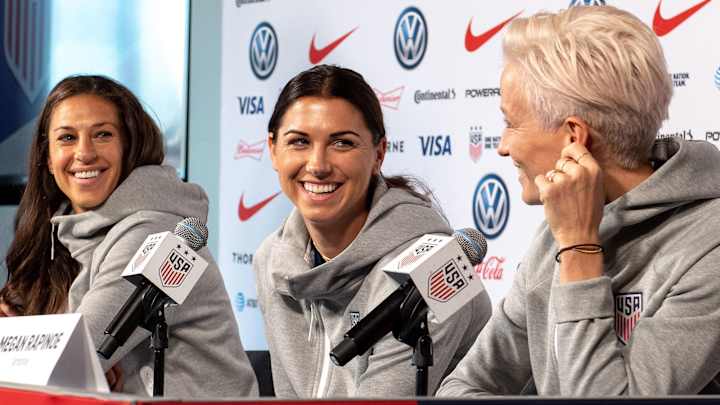What Olympic Postponement Means for the USWNT

No team has ever followed winning the Women's World Cup by claiming Olympic gold the following year, and, based on a technicality, that trend is guaranteed to continue in 2020.
That's not because the 2019 Women's World Cup champion U.S. women's national team will necessarily falter on the Olympic stage, but it's because the Olympics have been postponed. The IOC and Japanese government announced Tuesday that the 2020 Tokyo Games will be pushed to 2021 due to the global coronavirus pandemic, with the exact timing yet to be determined. According to the IOC's statement, the Games "must be rescheduled to a date beyond 2020 but not later than summer 2021." There are myriad knock-on effects from such a monumental decision, some of which apply directly to the USWNT.
Here are three of the key ones:
Alex Morgan has more time
Morgan is due to give birth to her first child in April, and she had always maintained that she would do what she could to immediately get back into top shape so she could participate in the Olympics. She even joined U.S. training (obviously in a limited capacity) last month ahead of a decisive Olympic qualifying match to stay in touching distance of the team. A three-month postpartum window is incredibly tight, though, even for the most world-class of athletes, and the intensity of the workouts to get back to full fitness coupled with the focus on Vlatko Andonovski's decision whether or not to bring her to Japan as part of an 18-player roster would have put plenty of pressure on both the player and coach.
Now, that is no longer a concern, not for the dynamic U.S. center forward and not for her manager, who has been very supportive of her personal quest ever since taking charge and replacing Jill Ellis in late October.
Depending on the timing of the 2021 Olympics, Morgan could have up to another year to get back into full shape and top form, something that seems like way less steep of a mountain to climb. The postpartum period differs for everyone and can't possibly be predicted ahead of time, but with a much longer recovery period at her disposal, you can bet on Morgan to be raring to go when the Olympics actually take place.
A potential setback for the aging stars
The U.S. women's team is blessed with experience and veteran leadership, but the flip side of that is that the U.S. still heavily relies on an aging cast of players. The 2020 Olympics could have been the last international hurrah for players like Carli Lloyd, Megan Rapinoe, Becky Sauerbrunn and Ali Krieger, all of whom played in Olympic qualifying this winter and were in frame to make the final squad. Will they all be able to hang on for another year?
If it's a full year postponement and the Olympic tournament doesn't start until July 2021, then Lloyd, who turns 38 this July, will be 39 by the time the competition is underway. Rapinoe, who turns 35 this July, will be 36. Sauerbrunn, who turns 35 this June, will also be 36. Krieger, who turns 36 this July, will be 37. Those are not insignificant numbers for a series of significant players, and with roster spots at a premium for the competition, age–and the potential decline in ability that comes along with it–could become a real factor for players who may otherwise have been shoo-ins to make the trip.
A massive change to the competitive calendar
The international women's soccer calendar–specifically the USWNT's–is a weird one. There is essentially a yearlong sprint between the Women's World Cup, Olympic qualifiers and Olympics followed by three years of friendlies, experimentation and second-rate tournaments. After flaming out of the 2016 Olympics in Rio, for instance, the U.S. women didn't play a truly meaningful game for years.
Now, things will be a bit more spread out, but players will also have to do what they can to maintain their peak forms for another year. That's a boon for NWSL in 2020 (whenever the season begins), which otherwise likely would have lost 18 key players to pre-Olympic training camp and post-Olympic recovery.

Avi Creditor is a senior editor and has covered soccer for more than a decade. He’s also a scrappy left back.